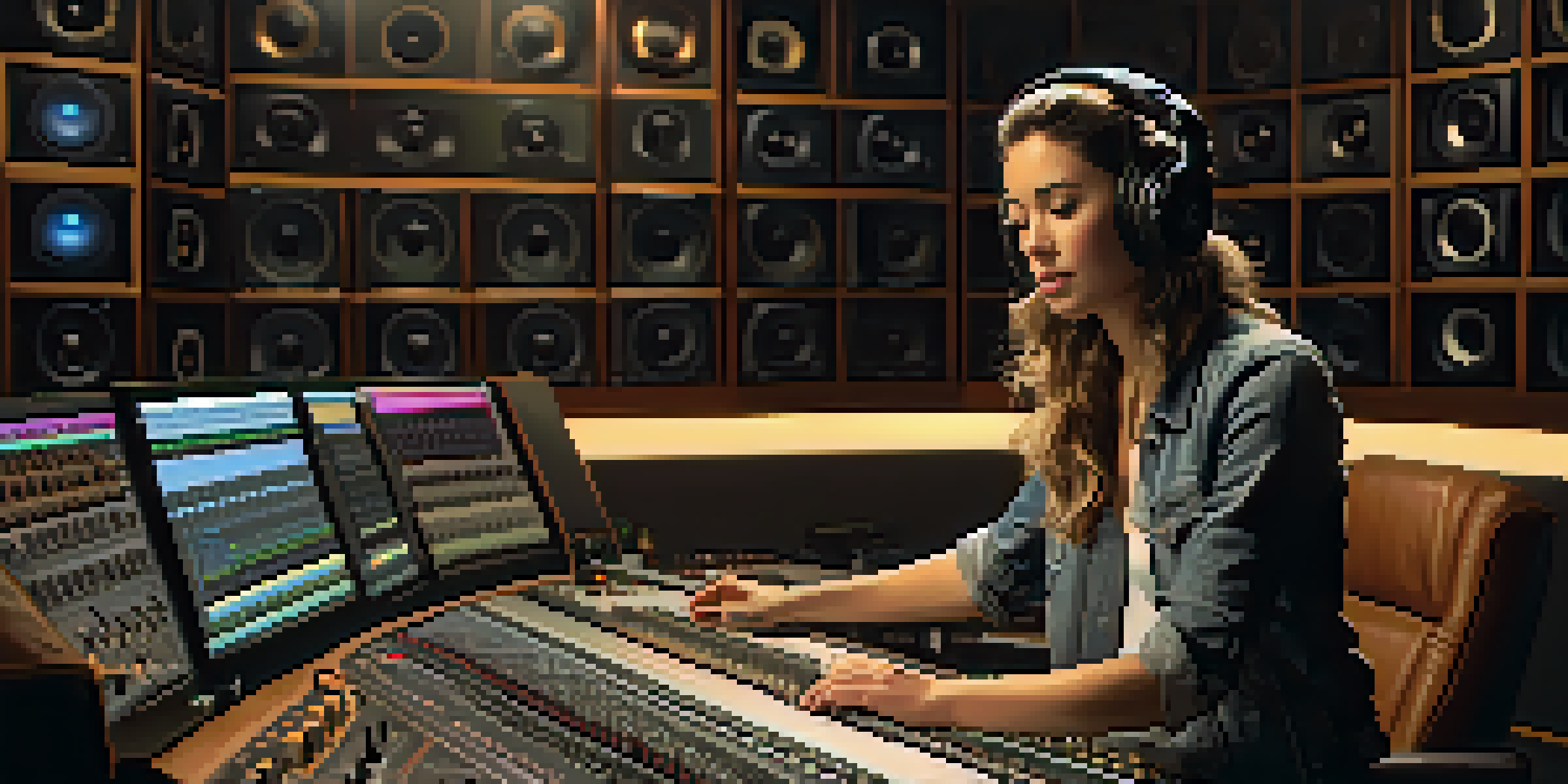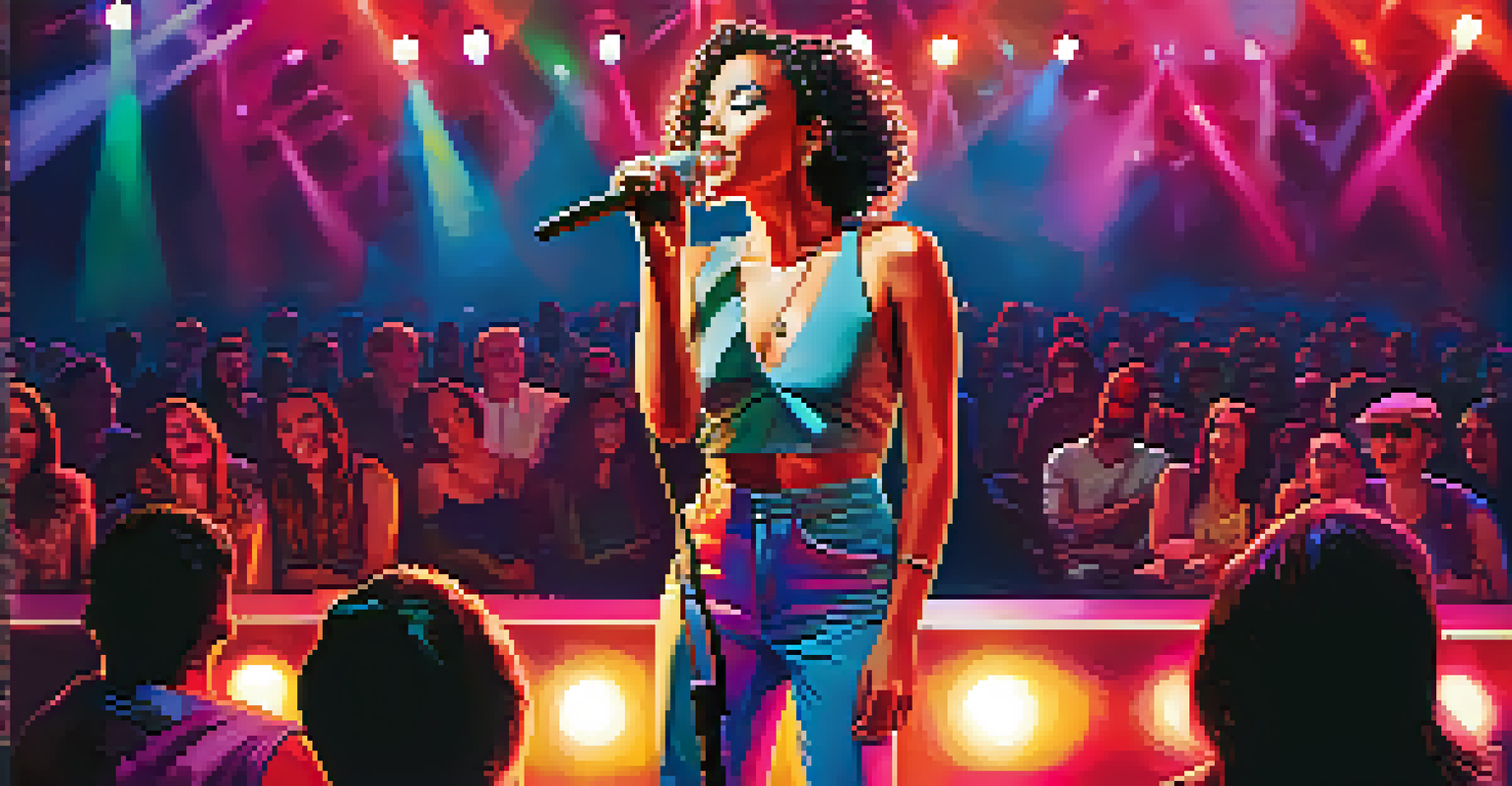Challenges Faced by Women in the Music Industry Today

Gender Inequality in Music: A Persistent Challenge
Despite progress, gender inequality remains a significant issue in the music industry. Women often find themselves underrepresented in key roles such as producers, sound engineers, and executives. This imbalance can perpetuate stereotypes and limit opportunities for female artists.
The music industry is still a man's world, but there are ways to change that narrative.
When discussing gender inequality, it’s crucial to highlight the stark statistics. For example, studies have shown that less than 20% of music producers are women. This lack of representation can hinder the diversity of voices and perspectives in music, ultimately affecting the quality and richness of the art form.
Moreover, the systemic barriers women face can discourage emerging talent. Young women entering the industry may feel disheartened when they see a predominantly male environment, which can lead to self-doubt and a hesitance to pursue their musical ambitions.
Balancing Personal Life and Career: A Tough Juggling Act
One of the most significant challenges for women in music is balancing personal life with their careers. The demanding nature of the industry, including long hours and constant travel, can make it difficult to maintain relationships and family obligations. This issue is compounded for women, who often face societal expectations regarding caregiving.

Consider the story of a successful female artist who juggles touring while raising children. Many women in the industry share similar experiences, feeling torn between their passion for music and their responsibilities at home. This struggle can lead to stress and burnout, ultimately affecting their professional performance.
Women Underrepresented in Music
Despite progress, women remain significantly underrepresented in key roles within the music industry, limiting diversity and opportunities.
The industry is slowly becoming more supportive, with initiatives aimed at promoting work-life balance. However, much work remains to create an environment where women can thrive both personally and professionally without feeling they have to sacrifice one for the other.
Sexual Harassment: An Ongoing Issue in Music
Sexual harassment is a pervasive issue that continues to plague the music industry. Many women have shared their experiences of harassment, which can occur at various levels, from the studio to the stage. This toxic culture not only affects individual artists but also discourages many aspiring musicians from entering the field.
Women are not a niche. We are half the world. We deserve to be on stage, behind the stage, and in the boardroom.
The #MeToo movement has shed light on the severity of this problem, empowering women to speak out and demand change. Artists and industry professionals are now more vocal about the need for safer working environments, but the road to significant change is still long.
Creating awareness and implementing strict policies against harassment is crucial for fostering a positive culture in music. Industry leaders must prioritize the safety and well-being of female artists to encourage a more inclusive and respectful atmosphere.
Lack of Representation in Music Genres
Women often face challenges in gaining recognition within certain music genres. Genres like rock, hip-hop, and electronic music have historically been male-dominated, making it difficult for female artists to break through. This lack of representation not only limits visibility but also affects the diversity of sound and creativity within these genres.
Take, for instance, the rise of female artists in country music over the past few years. While progress is evident, women still struggle for equal airtime and recognition compared to their male counterparts. This disparity can discourage emerging female talent from pursuing careers in these genres.
Balancing Career and Family
Women in music often struggle to balance demanding careers with personal life, facing societal expectations that complicate this juggling act.
Encouraging more inclusive spaces within these music genres is essential for nurturing female talent. By promoting women’s contributions and empowering them through mentorship, the industry can create a richer, more diverse musical landscape.
The Challenge of Funding and Sponsorship
Securing funding and sponsorship can be particularly challenging for women in the music industry. Female artists often find it difficult to attract investors and sponsors compared to their male peers, which can limit their ability to produce music, tour, and promote their work. This financial disparity can stifle creative expression and growth.
Many women have shared stories of how they struggled to secure the necessary resources to launch their careers. For example, a talented singer-songwriter may have the skills and drive but lack the financial backing to record a professional album or embark on a tour.
Increasing visibility for female artists and fostering partnerships with organizations that support women in music can help bridge this gap. By advocating for equitable funding opportunities, the industry can empower women to flourish and contribute their unique voices to the musical landscape.
The Impact of Stereotypes on Female Artists
Stereotypes about women in music often hinder their artistic expression and career growth. Female artists may find themselves pigeonholed into specific genres or styles based on societal expectations, limiting their creative freedom. This can create pressure to conform, rather than allowing them to explore their unique sounds and identities.
For instance, a pop artist might feel compelled to maintain a particular image that aligns with traditional beauty standards. This pressure can take a toll on mental health and overall career satisfaction, leading many talented women to feel they must compromise their authenticity.
Stereotypes Hinder Female Artists
Stereotypes about women in music restrict their artistic expression and career growth, pressuring them to conform to societal expectations.
Challenging these stereotypes is crucial for fostering a more inclusive music culture. By celebrating diversity and encouraging women to embrace their individuality, the industry can pave the way for a richer tapestry of musical expression.
Navigating Industry Networks and Opportunities
Networking is a vital component of success in the music industry, yet women often find it more challenging to access these crucial connections. Many industry events and gatherings are still male-dominated, making it difficult for women to build relationships and find mentors. This lack of support can hinder their career advancement and visibility.
Imagine a talented female musician attending a music festival where most networking opportunities are informal gatherings among male artists. She might feel excluded or unsure about how to approach potential collaborators, which can be disheartening. These experiences highlight the importance of fostering inclusive networking environments.

Creating spaces where women can connect, share experiences, and support one another is essential for overcoming these barriers. Initiatives that promote women-centered events and mentorship programs can help build a stronger community, empowering female artists to thrive.
The Future: Advocating for Change in the Music Industry
As we look to the future, advocating for change within the music industry is more important than ever. Many organizations and initiatives are working to address the challenges faced by women, from promoting gender equality to creating safer work environments. However, lasting change requires collective effort from all industry stakeholders.
Engaging both men and women in discussions about gender equality can foster a more inclusive culture. Men in the industry need to act as allies and support their female colleagues, helping to amplify their voices and experiences.
By continuing to advocate for change and supporting initiatives that empower women, we can create a more equitable music industry. Embracing diversity will not only benefit female artists but also enrich the overall landscape of music for everyone.